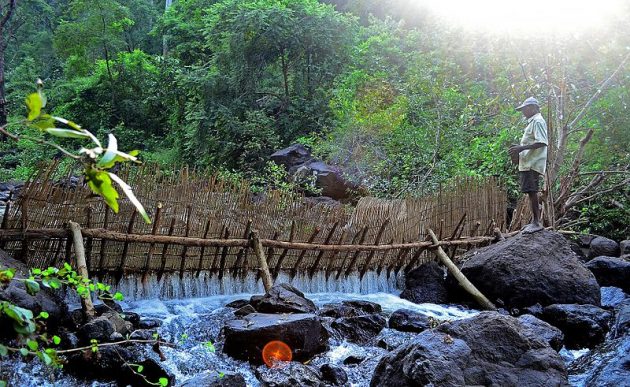There is a growing urgency to recognize water not only as the elixir of life, but also a resource far more precious than gold

The intermittent announcements by the PWD about restricted water supply due to urgent maintenance works planned have always elicited a muted response from the public.
It was nothing different a fortnight back, when a similar public notification was issued in public interest in the whole of Salcete.
Maybe it comes from an inevitability of the exercise where the public is yet to grasp the seriousness of the whole situation and see it as nothing more than a routine affair that they have to put up with occasionally.
No doubt, as a proactive approach that prevents deterioration, regular maintenance works are essential for extending the life of the infrastructure.
That is not to say that ‘Saxtticars’ have always enjoyed the luxury of uninterrupted water supply. Over the years, some major disruptions on the main line have caused enough problems for the residents. However, the frequency of ‘water outages’ has considerably waned now.
With reports emanating from different parts of the country about the scarcity of potable water, it is time Goans realized that they are pretty fortunate living in comparative comfort in this regard.
For, having round-the-clock supply of water is nothing short of a luxury. But it is something that has been taken for granted by people in this part of the country. For many people though, access to clean water continues to be a daily struggle.
The scenario has not been all that encouraging with tales of misery being recounted many times over in various parts of the state as well. Not a day goes without reports about irregular water supply in the region garnering headlines.
It is the urban settlement which has been gracious and scathing in equal measures about the blissful state that it is in - ‘Gracious’ for the wonderful sight of water gurgling out from the pipes, and ‘scornful’ if there is the slightest let-up in the uninterrupted flow.
This comes from a situation where people have assumed that such public utilitarian services are theirs by right rather than a benefit for their common good. This misplaced assumption however created a mindset which refuses to accept the denial of these ‘entitlements’, even if it is for a short and specified duration.
The recent maintenance shutdown made this attitude adequately evident!
On being questioned about the availability of water after the maintenance works were completed, one of the Public Health Engineers (PHE) informed my friend residing at Fatorda that it would be many hours after the water was released as it has to ‘traverse’ through various pipelines, sumps and tanks in various areas enroute, after being pumped from Selaulim.
A modern urban water supply system is a large and complex network, and after a system-wide shutdown for maintenance, several factors contribute to a significant time delay before water is fully restored to every household.
For many, clean water is a constant, invisible utility that is not thought about until there is a shortage, contamination, or service interruption.
People take water for granted due to its perceived ‘abundance’ and easy access in many developed areas. That could probably be the reason that ‘encourages’ members of the public to overlook leaking pipelines and overflowing water.
For instance, the obliviousness to the overflowing overhead tanks is so typical of families residing in housing complexes!
People are accustomed to seeing leaks and overflows which are a constant everyday sight getting attended to. So such instances hardly bother them.
The belief that utility services and related infrastructure is the government’s responsibility and that their individual actions will have little or no impact deters them from taking corrective steps. People do not even complain to the authorities!
It is only a ‘crisis’ which invariably forces a fundamental shift in perception, moving water from an overlooked ‘commodity’ to a precious resource that must be managed and conserved.
Admittedly, in Goa, the water scarcity issue affects both rural and urban areas, but the situation is more pronounced in rural areas due to several factors.
Aging and inadequate infrastructure, including pipelines and treatment plants, contribute to irregular water supply.
Besides, rural areas often face difficulties in accessing clean water sources, with some villages located at higher altitudes or at the tail-end of water supply systems. More pertinently, rural areas may have limited access to alternative water sources, making them more vulnerable to water scarcity.
However, the problems are manifold for the urban belt!
The rapid urbanization that is being witnessed with grand housing and commercial projects coming up in every nook-and-corner of the state will definitely lead to over-exploitation of resources, greater pressure on infrastructure, and potential water scarcity.
Despite the best efforts by the government to implement initiatives to improve the situation, water scarcity remains a pressing issue in rural Goa.
Resource conservation is the responsible and sustainable management of natural resources to ensure their availability for future generations.
It involves using resources carefully, reducing waste, and protecting ecosystems to balance current human needs with long-term environmental health.
This practice is crucial for preventing issues like scarcity and pollution, and for maintaining biodiversity.
But, people are generally in the habit of deflecting responsibility by pointing to other larger problems, such as agricultural or industrial water consumption, as if their own conservation efforts do not matter in comparison.
There is a growing urgency to recognize water not only as the elixir of life, but also a resource far more precious than gold.
The misplaced human tendency to value a scarce but non-essential commodity over a common but indispensable one reveals a fundamental psychological and economic irony -- a phenomenon which prioritizes perceived value and status over genuine utility.